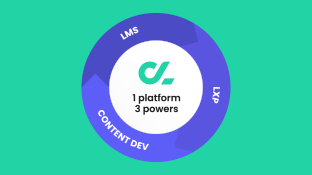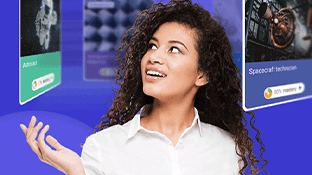Learning experience platform glossary & common terms

Dive into the dynamic world of Learning Experience Platforms (LXP) with our comprehensive glossary, designed to demystify the jargon and acronyms prevalent in today's world of digital learning. This resource is perfect for those who are eager to grasp the nuances of LXPs, and are excited in learning how features like Skill Mapping, Microlearning, Mobile Learning, Discoverable Content, and more can change the way they and their peers learn forever. Perfect for newcomers and seasoned professionals alike, this glossary is your key to understanding the intricate facets of Learning Experience Platforms.
One or more individuals in an organization responsible for configuring and customizing permissions for the learning experience platform, ensuring its effective use and alignment with organizational goals.
More Administrator
A flexible and adaptive learning approach that embraces iterative development, collaboration, and responsiveness to changing needs. Agile learning supports quick adjustments and improvements in the learning process.
Personalized suggestions and recommendations delivered through artificial intelligence to guide learners to relevant and beneficial content based on their preferences, performance, and learning history.
More AI 360
Methods and tools used to evaluate customer, vendor, and partner learning and competencies. Assessments provide valuable feedback on individual progress and help measure the effectiveness of learning experiences.
More Assessment
Digital credentials that highlight newly acquired skills and accomplishments. Certifications validate the successful completion of specific learning objectives and contribute to learners' professional development.
More Certifications
An AI-driven conversational agent designed to provide instant support and assistance to learners. Chatbots enhance user experience by offering real-time responses to queries and facilitating engagement.
More Chatbot
The process of gathering and compiling learning content from various sources to create a diverse and comprehensive learning experience. Content aggregation ensures a rich and varied educational journey.
More Content aggregation
The thoughtful selection, organization, and presentation of relevant learning content from diverse sources. Content curation ensures that learners have access to high-quality and up-to-date materials.
More Content curation
The process of creating and designing educational courses, ensuring alignment with learning objectives, engagement strategies, and effective content delivery methods.
More AI 360
The advanced analysis of learner data to inform decisions and enhance learning experiences. Data analytics in the context of an LXP involves extracting valuable insights to improve content, engagement, and overall learning outcomes.
More Data analytics
The delivery of tailored learning resources using analytics, AI, and Machine Learning. This approach systematically collects, analyzes, and interprets user data to offer personalized courses, track learner performance, and provide adaptive content recommendations.
A user-centric interface providing a visual overview of individual learner, course, and account data. Dashboards serve as a navigation tool for administrators and learners, offering insights into progress within intricate learning paths.
More Dashboard
Content delivery facilitated by AI and Machine Learning, tailoring material to individual learner needs and skill levels. Discoverable content utilizes diverse formats and sources, enhancing engagement and relevance.
A comprehensive approach to learning within an organization, focusing on the strategic alignment of learning initiatives with business goals to foster continuous development and success.
More Enterprise learning
The incorporation of engaging activities and game elements, such as points, leaderboards, badges, and certificates, into the learning experience. Gamification enhances motivation and participation in training programs.
More Gamification
The systematic process of creating effective and engaging learning experiences. Instructional design involves analyzing learner needs, defining learning objectives, and developing instructional strategies for optimal learning outcomes.
More AI 360
The seamless incorporation of external tools, applications, or systems into the learning platform. Integrations enhance functionality and allow for a more comprehensive and connected learning experience.
More Integrations
An advanced online learning platform designed to provide a personalized and social learning experience. LXPs focus on tailoring content to individual users, fostering collaboration, and creating a dynamic, engaging learning environment.
More LXP
The field of study enabling computers to learn without explicit programming. In the context of learning platforms, machine learning supports adaptive content delivery, personalized recommendations, and data-driven insights.
The delivery of learning content in small, focused bursts, concentrating on key topics or skills. Microlearning aims to provide quick, easily digestible information for efficient learning.
The capability to access learning content and experiences through mobile devices. Mobile learning offers flexibility, allowing users to learn anytime and anywhere using smartphones or tablets.
Customizable learning trajectories that are tailored to the unique needs, skills, and interests of individual learners. Personalized learning paths enhance engagement and effectiveness by addressing specific learner requirements.
The continuous advancement and development of learners through various stages of their learning journey. Progression reflects the ongoing improvement and achievement of learning goals.
Organized path sessions designed for different cohorts of learners, with the ability to choose the most suitable instructor for each cohort. Sessions enhance the organization and delivery of specific learning content.
The process of identifying and categorizing skills within an organization and aligning them with individualized learning paths. Skill mapping ensures targeted skill development for organizational and individual growth.
More Skill mapping
The ability to tag content and courses with specific skills, enabling learners to easily search for relevant courses and engage in self-enrollment based on their skill development needs.
A learning approach that integrates social interactions and collaborations among learners. This includes peer reviews, forums, and group projects, fostering a sense of community and shared knowledge.
A versatile specification enabling comprehensive tracking and reporting of diverse learning experiences and interactions, surpassing traditional SCORM standards for data capture.
More API 2.0
The process of acquiring new skills or enhancing existing ones to meet the changing demands of the workforce. Upskilling is crucial for individual and organizational growth in a dynamic environment.
More Upskilling
The overall impression and satisfaction a user has when interacting with a learning platform. User experience encompasses ease of navigation, accessibility, and the overall usability of the platform.
More User experience
Educational content created and contributed by users, such as learners, fostering a collaborative learning environment through diverse mediums like blogs, videos, and discussions.

